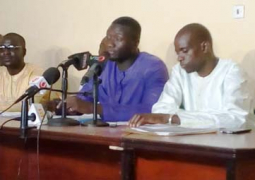The executive director of the National Women Farmers Association (NAWFA) has underscored the importance of promoting adult literacy to enhance productivity, food production and poverty.
Njaga B. Jawo was speaking on Friday at a 6-day literacy facilitators training on the theme Literacy for self-management.
Held at Chamen Seed Multiplication and Training Centre in the North Bank Region, the training aimed at building the capacity of women and youth to be good in managing business and calculating income.
He said enhancing farmers’ capacity in literacy skills will enable them to adhere to best agricultural practices to increase production and ultimately improve their livelihood and lives.
NAWFA works with women, he said, adding that recent data indicate high illiteracy among women hence the training would contribute immense to empowering the women and youth to bring sustainable development.
The NAWFA director lauded the National Agricultural Land and Water Management Project, (NEMA) for partnering with NAWFA to increase literacy for self-management on agronomic practices and vegetable production.
He used the occasion to thank NEMA for the support, whilst encouraging the project beneficiaries to effectively learn and acquire the skills and knowledge being imparted in them.
Fatou Samba Njie, programme coordinator at NAWFA, noted that literacy for self-management would support farmers to carry out simple calculation and keep track of all farming calendar and marketing of their farm produce.
The 27 beneficiaries of the literacy training were drawn from NEMA intervention sites across the country.
NAWFA with support from NEMA has produced and printed learning and teaching materials for all the centres to enhance effective learning environment.
The NAWFA program coordinator reiterated her agency’s commitment to empower farmers with the view to managing farmer field schools, improving business management and creating linkage with microfinance institutions to ensure farmers promote savings as well as have access to credit facilities.
Kitabu Jabang, the lead trainer, applauded NAWFA and NEMA for their foresight in enhancing the capacity of rural farmers through promoting the concept of adult literacy.
Literacy is crucial in human development and poverty reduction, he said, adding that Literacy for Self-Management would complement farmers’ ability to keep track of record keeping.
The training covered areas such as introduction to alphabets, letter formation, syllables formation and sentence construction.
Sana Singhateh, Sustainable Land Management /NEMA Focal Person on rice in NBR, noted that the programme would strengthen literacy programme.
He said literacy would enhance record keeping and promote good governance and public accountability.
The focal point also asserted that literacy would help farmers to manage farmer field schools on rice production.
He thanked the communities for their support to NAWFA and NEMA in realizing the initiative.


